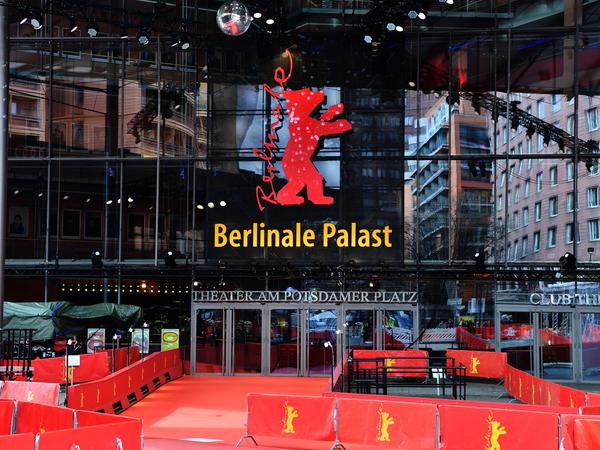The African silver ant would also look good on the sustainable Berlinale. Its reflective hair, which gives it its silvery shine, serves as natural protection against the adverse climatic conditions on the equator in the blazing heat of the Sahara. A practical side effect: the hairy protective shield lowers the body temperature of the insects.
This brief foray into entomology has something to do with the Berlinale in that it brings a theory to this year’s opening film, She Came to Me, capping Rebecca Miller’s dysfunctional family comedy with a gorgeous final shot. The curious community of destiny chugs towards a better future on a rusty barge, instead of diesel oil, solar panels inspired by the silver ant’s shell provide the climate-neutral drive.
It starts with a comedy about a dysfunctional family
So there it is, the new Berlinale – if you understand the artistic director Carlo Chatrian correctly, who has repeatedly spoken of a “restart” in recent weeks, with fully booked halls and a functioning cinema market. Judging by the opening film, however, much remains the same in the fourth year of the dual leadership of Carlo Chatrian and Mariette Rissenbeek.
“She Came to Me” is the sort of Hollywood cinema that kicks off the festival with some big names that will satisfy glamor-addicted Berliners. (Or could it be that it’s always just cultural criticism that nags about not having enough stars on the red carpet?)
Peter Dinklage plays opera composer Steven in a creative crisis in She Came to Me, Anna Hathaway his wife Patricia, an outwardly functioning but highly neurotic therapist, and Marisa Tomei a barge captain with a romance addiction to the objects of her desires – in this case Dinklage’s completely overwhelmed composer – offensively pursued. Julian (Evan Ellison), the couple’s 18-year-old son, is dating the underage daughter of Polish cleaning lady Magdalena (Joanna Kulig), which causes irritation when the parents get their hands on some playful nude photos of the teenagers.
On paper that reads too hard, but Rebecca Miller, who already staged Greta Gerwig in “Maggie’s Plan” as a wonderfully over-the-top bundle of neuroses, can rely on the leading actors in her romantic comedy, who, compared to the conventions of the genre, are always a little running off track.
First impressions also count at film festivals, and the Berlinale has often started off on the wrong foot in the past. In this respect, Miller’s film can be seen as a successful compulsory exercise that doesn’t set the fall height too high, but sends an optimistic message to the film world.

At the festival this year, there is pressure in a completely different place, even solar panels on the Berlinale Palace would hardly distract from the acute concerns. Instead, the Berlinale is countering the energy crisis by increasing ticket prices by two euros, despite an additional 2.2 million euros from the budget of Minister of State for Culture Claudia Roth. This has already caused resentment. It remains to be seen whether this will lure people back to a public festival.
The fact that Claudia Roth also addressed greetings to the film industry on Thursday morning comes as no surprise in a year in which five German films competed for the first time (not to mention the international success of the Netflix production “Nothing New in the West”). A year ago, Roth debuted in her new role as patron of German film with big promises at the Berlinale – which twelve months later read like slogans to persevere.
She inherited the challenge of a new film subsidy law, the amendment of which has already been postponed twice, from her predecessor Monika Grütters. The problems of German subsidized cinemas have been extensively discussed, the particular interests between film art and industry, producers, cinema operators and distributors, the problems of the confusing subsidy bureaucracy between the federal and state governments are well known.
Claudia Roth gives a keynote speech on the future of film funding
Roth’s statement, announced as a keynote speech at the Producers’ Day, which traditionally takes place at the opening of the Berlinale, did not add any new insights to this starting point. Except that she, too, confirmed once again that the problems of German film funding, and thus those of German cinema, had now really been understood.
Their eight reform approaches, including the establishment of a film agency that bundles the federal subsidy measures, new tax incentive models, the obligation for global streaming services to reinvest in the local infrastructure, the dubious influence of the public broadcasters and the regional princes with their jagged State subsidies are likely to quickly collapse again when it comes to concrete proposals for solutions. One reason for this is the absurd scenario that German cinema lacks money (and audience), but many other parties make good money from it.
Culture should not be subordinated to profitability.
Minister of State for Culture Claudia Roth at the Producers’ Day
This problem is directly related to the Berlinale, which is particularly evident this year. In an interview with the Tagesspiegel two weeks ago, Chatrian noted that one year the Berlinale is showing too few German films in the competition, and the next there are complaints about too many. But this is not a quality problem: the films by Margarete von Trotta, Emily Atef, Christoph Hochhäusler and Angela Schanelec have already been shown in Venice, Cannes and Locarno, they undoubtedly belong in the competition. However, it is becoming apparent that the Berlinale is gradually taking over the function of a biotope for the ailing German cinema.
Kristen Stewart and Golshifteh Farahani outshine the competition
German films have recently played no significant role at other festivals. In the light of the awards at the Film Prize and the successes at the Berlinale, German cinema could of course continue to bask in the future. The point is that both are largely financed from the budget of the Minister of State for Culture. However, there is a danger that the local film industry will settle into this comfort and further isolate itself internationally. That would also be fatal for the charisma of the Berlinale, the most important showcase for German film.
A side effect of this development is that the Berlinale jury with the two stars Kristen Stewart and Golshifteh Farahani outshines the competition this year in purely nominal terms. You don’t necessarily have to know the directors in the Bären competition, such as the American Celine Song (“Past Lives”, which already had its world premiere at the Sundance) or Lila Avilés (“Totem”); with the Nouvell Vague director Philippe Garrel at least a doyen is represented. If you want to impute a strategy to Chatrian, who sees himself as a mentor to “his” films, then it would be to take the pressure off the small films in this way. However, if you exclude the German films, this year’s competition is more like a grab bag.
It’s been a while since the last film in the Berlinale competition that went on to become an international success story – whether at the Oscars or the European Film Awards. Chatrian has to ask himself which cinema market he is still targeting his festival to today. Very few films from the past competition made a big impression in cinemas; “Robe of Gems”, after all the winning film of the 2022 Jury Prize, will start directly on the Mubi streaming platform during the Berlinale. One can only wish the Berlinale all the best for the restart.
To home page

